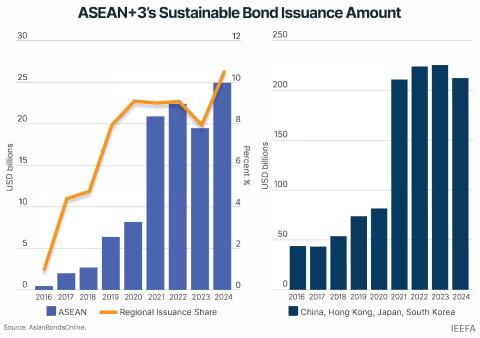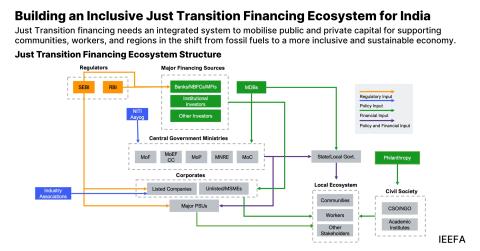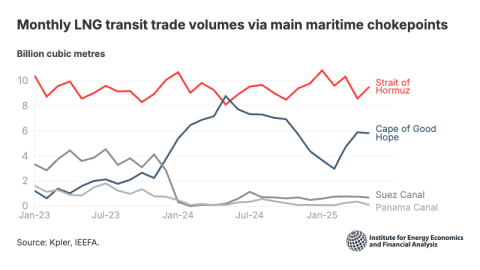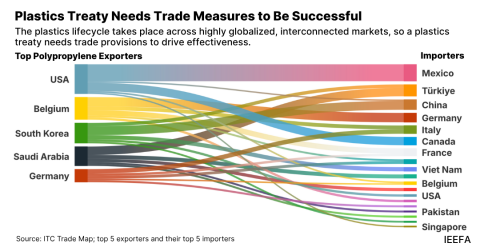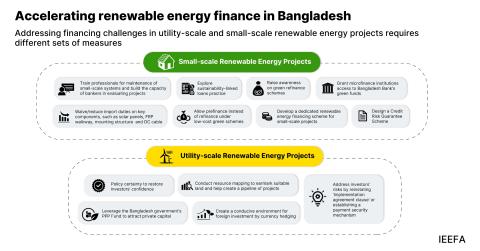IEEFA update: Blackstone could provide Indian energy security a strong boost
One of the world’s leading private equity investment firms, the Blackstone Group, could put itself into the spotlight.
Recent commitments from BlackRock and JPMorgan Chase are pressuring other significant financial institutions to alter their business models
Significant recent commitments from BlackRock, the world’s biggest equity manager, and JPMorgan Chase, the world’s biggest bank, to more closely align with the Paris Agreement and invest in zero-emissions renewable energy systems of the future, is putting pressure on other significant financial institutions to alter their business models away from fossil fuels and accelerate zero-emissions renewable energy alternatives.
Blackstone is the world’s leading private equity investment firm with assets under management (AuM) of US$571bn as of December 2019 (up 21% year on year) split between property, private equity and credit, including over US$13bn invested in India.
Blackstone claims a focus on sustainability is at the core of its global business.
Wouldn’t it be grand for Blackstone’s founder and CEO, Stephen Schwarzman, to announce an intention to invest in Indian renewable energy and/or grid infrastructure during his visit this week to India’s Global Business Summit (6-7 March 2020)?
For a more sustainable economic growth platform, it is critical that India improve its energy security by reducing its reliance on ever-larger fossil fuel imports.
Prime Minister Narendra Modi’s vision of 450 gigawatts (GW) of renewable energy by 2030, requires a total generation and grid investment of US$500-700bn to build out a zero-emissions, domestic, low-cost and sustainable electricity system. This, in turn, would permanently improve India’s air pollution and put the country on a world-leading path to progressive decarbonisation.
Goldman Sachs, the world’s largest investment bank, is already the biggest foreign investor in Indian renewable energy, through the country’s leading renewable energy company ReNew Power.
IT WOULD BE A HUGE ENDORSEMENT OF INDIA’S GLOBALLY IMPORTANT ENERGY TRANSFORMATION were Blackstone to announce it is bringing its global firepower to help accelerate investment in this sustainable, profitable domestic energy solution.
It would, indeed, be commendable if Blackstone also continued avoiding any fossil fuel investments in India. While portfolio investments, like warehousing and logistics, tend to have a large carbon footprint, they also bring the possibility of leveraging behind-the-meter distributed rooftop solar, electric vehicles and energy efficiency solutions, which Blackstone could develop as a concurrent, aligned investment strategy.
Blackstone in India
Blackstone claims it is seeking “to create positive economic impact and long-term value for our investors, the companies in which we invest, and the communities in which we live and work.” This includes a stated core objective of being more environmentally sustainable.
Blackstone has been active in India since 2006, and has committed over US$13bn of investments in the country split equally between private equity and real estate, making India Blackstone’s largest market in Asia.
Back in 2018, Blackstone claimed it had recorded an annualized internal rate of return of some 30% on its India private equity investments since 2011, the highest among its markets worldwide.
Last year, Blackstone acquired Aadhar Housing Finance Limited with AuM of Rs100bn (US$1.4bn) in February 2019 for US$500m and then Aakash Educational Services Limited in October 2019, a business teaching more than 250,000 students across 130 cities in India, whilst also investing US$1.4bn in Indian commercial property, including acquiring the outstanding minority stake in Indiabulls Real Estate Ltd’s commercial real estate portfolio. This follows Blackstone’s largest purchase in India, in September 2016 when it invested US$870m to buy control of Mphasis Ltd., a Bengaluru-based technology services provider, from Hewlett Packard Enterprise Co.
The Indian economy deserves a quick course correction founded on sustainable, domestic renewable energy
In January 2020, Blackstone said fears of an ongoing economic crisis in India are likely to be put to rest, suggesting India would recover from decelerating growth: “The Modi government continues business-friendly growth reforms, the economy grows at 6% and the market rises 20%.” Hopefully the headwinds unleashed by the coronavirus will abate soon, and will not undermine this projection too extensively.
While India accounts for low per capita carbon dioxide emissions, given the sheer size of its population, it stacks up as the third most polluting country in the world. With an assured growth pipeline over the coming decades driven by a large, aspirational, well-educated middle class population, the Indian economy deserves a quick course correction — a pathway founded on sustainable, domestic renewable energy.
The Indian government’s long-term objective and commitment to transform its power sector with 450GW of total renewable energy capacity by 2030 provides a US$500-700bn investment opportunity for global investors.
BLACKSTONE WOULD BE AWARE OF WHAT ITS GLOBAL PEERS ARE DOING IN INDIA. Actis and Brookfield, two top investors in global renewables infrastructure, recently competed to acquire 600MW of solar capacity owned by one of India’s top solar developer, ACME solar. In February 2020, Actis outbid Brookfield to acquire this capacity for Rs3,000 crore (US$400m).
Blackstone’s investments in India to date have been largely transactional. To be truly impactful, it needs to become a transformational player.
From being its largest market in Asia and the most profitable globally, Blackstone ought to strive to showcase India as its most ESG-driven corpus – highlighting that sustainability is at the core of its global business.
Praveen Gupta is a former CEO, and has spent nearly four decades in the insurance industry. Having worked in India, U.K., Hong Kong and Thailand, Praveen writes and speaks on a broad range of subjects. He is particularly passionate about climate change.
Tim Buckley is director of energy finance studies, IEEFA South Asia.
Related links:
Policy certainty and stability sought to increase renewable energy development and investment
India gets out of coal and into renewables
India’s stranded asset risk in thermal power sector underestimated
Government incentives increasing green investment by state-owned enterprises
BlackRock to investors: sustainable portfolios provide stronger risk-adjusted returns
BlackRock decision on climate change‒it’s about business






